Can you believe Q1 is half over? It feels like 2024 is flying by, so let's jump right into this week's edition.
In today’s edition, we cover the importance of purpose at work, analyze recent findings from Slack's Workforce Index report, give you a chance to reach our subscribers, and give you 4 key approaches to help resolve conflicts at work.
Let’s dive in…
Table of contents:
- 🥘 Food for Thought on Sugar Water and Purpose
- 📰 News & Reports for Managers on Slack's Workforce Index Winter 2023
- 🗣️ Your Chance to Promote Your Offer, Opening, or Product
Note: This is a preview of our weekly leadership newsletter, Lighthouse Leadership Weekly (LLW).
To get this sent to your inbox every week, along with our latest long form essays on this blog, you can sign up here.
🥘 Food for Thought
“Do you want to sell sugar water for the rest of your life, or do you want to come with me and change the world?" - Steve Jobs, co-founder of Apple
This quote is famously attributed to Steve Jobs in his recruiting efforts to convince John Sculley, then President of PepsiCo, to become Apple's CEO in 1983.
I was reminded of this quote when I saw a great tweet this week:
“Do you want to sell sugar water for the rest of your life, or do you want to come with me and change the world?" https://t.co/4BBl4ulI8A
— Jason Evanish (@Evanish) February 6, 2024
How often do you think about your purpose?
I think most of us underrate how important purpose is. Yet, it's a secret fuel for our work and life.
When you feel like your work is losing its purpose, it can be hard to do anything for a job. Everything can feel like pushing a rock up a hill. Small issues feel deeply painful and require extra effort to deal with.
Meanwhile, when you feel like your work has great meaning for you, it's amazing how easy the work can be. Even major issues can be stressful, but not draining, while small issues roll off you like water off a duck's back.
It's easy to see this when you are very strongly in one camp or the other, but what about when you feel somewhere in between?
What if you like some parts about your job, and other parts don't work for you?
That's what this week's Food for Thought is all about.
Reflect on Your Purpose
Your emotions at work can be your guide on your purpose:
- Think about a recent time you were super happy and energized at work: What were you doing? What had just happened (or was about to)?
- Consider the last time you felt exhausted, drained, or unmotivated at work: What were you doing? What had just happened (or was about to)?
If you reflect on a few times that both situations have happened, you will likely start to see what kind of work touches on your purpose, and what work goes against your purpose.
As a manager, one of the best things you can do is lean into this. If you can do more of the work that energizes you, great! Your team will appreciate it, and your positivity will shine onto them.
Meanwhile, if there are tasks or aspects of your job that you feel is counter to your purpose, consider how that affects you and work to mitigate it's impact. That could be done a variety of ways, including:
- Working with your manager to shift away from those types of projects. A friend of mine shifted his work at a company that had a role in providing tech to an overseas conflict. He's much happier and fulfilled working on other projects and his manager is now keeping him off such projects now knowing this concern.
- Doing that work at a time where you'll get to take a break right after. This avoids the unintended consequences of being in a sour mood when you are trying to do other things with your team. Your attitude will rub off on your team otherwise.
- Remind yourself of the positives. It may seem simple, but reminding yourself of the parts of your job you like and feel purpose in can be a simple and effective way to get through parts you don't like as much.
Taking a little time to analyze yourself and recognize how your work affects you, both good and bad, can be a healthy exercise that tells you how you can become a more effective leader, as well as determine if it's time to move on.
How often do you remind your team of their purpose?
It's not just your purpose that matters. Your team's purpose matters, too. The more your team knows the value and impact of their work, and you can tie it to intrinsic motivation they have, the better their work will be, too.
There's a reason that Dan Pink's well-known TED talk anchors motivation around Autonomy, Mastery, and Purpose.
And best of all, talking about your team's purpose and helping them feel more meaning and value in their work costs you nothing.
All it takes is a conversation with them to learn what personally drives them, and for you to remind them of the value and impact of what they specifically do. Yes, sometimes people say, "Talk is cheap" but in this case, talk is exactly what you need to do, and will help your team be more motivated if you learn it and keep it in mind going forward.
Have you reminded your team of their purpose and value lately
If not, take a few minutes this week in your 1 on 1s to talk about purpose. You may be surprised what you learn and the impact it can have.
📰 News & Reports for Managers
📌 Key Takeaways from Slack's Workforce Index Winter 2023
We're always on the lookout for new studies on the workplace to take a look at. They're a great way to better understand what's happening in the world beyond our own teams and companies.
They also can give you hints of things to look out for on your team to see if what's common across the survey data also exists for you and your team. It's all too common to ask your team members about something you wouldn't have thought about until you saw a stat, and then find out they have a lot to say on the issue.
You don't know unless you ask.
That's why we're going over a bunch of the interesting takeaways from Slack's Workforce Index report; they should give you some interesting things to think about, and a few questions to check in on with your team.
This report (see it in full here) is based on over 10,000 responses to their surveys run through August and September of 2023, so it's both relatively recent data, and a statistically significant audience size.
Here's some of the most interesting takeaways I noticed:
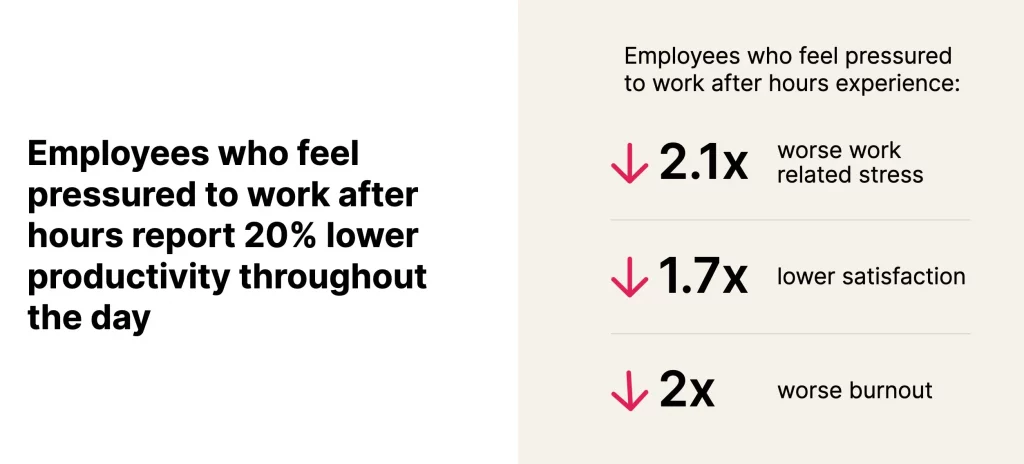
This shouldn't be surprising. If you can't leave work at work, and feel the pressure to always respond, you're going to be more likely to burn out. It's also likely you'll start to resent work if you feel like you have to be "always on."
This is an important cultural norm for your company. Whatever is typical, and the example you set, will determine what people feel they need to do:
- If you send messages and emails at all hours, your team will often feel pressured to do the same.
- If you strongly enforce what hours you're around (outside of obvious emergencies), then your team is more likely to also sign off for the day and stay that way.
If you have noticed some of your team seem more stressed lately, complaining of burnout, and putting in extra long hours without the best results, consider whether you want to tweak your team's culture around after hours communication and work.
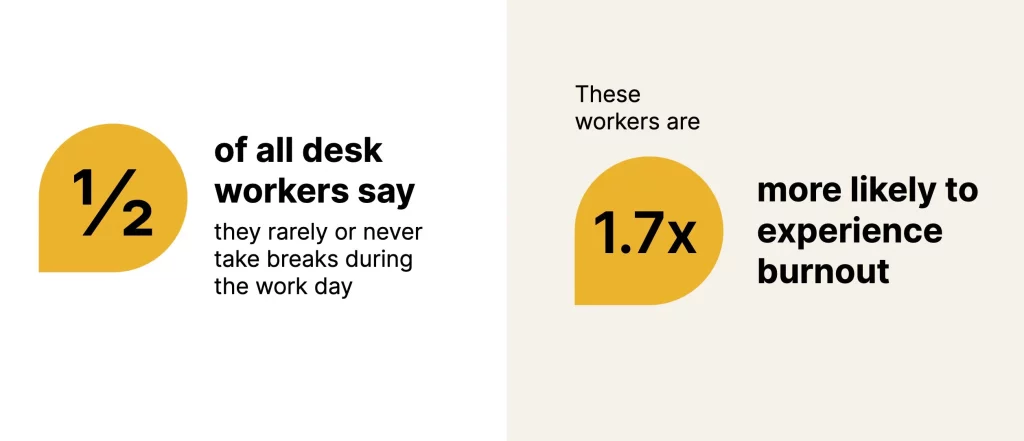
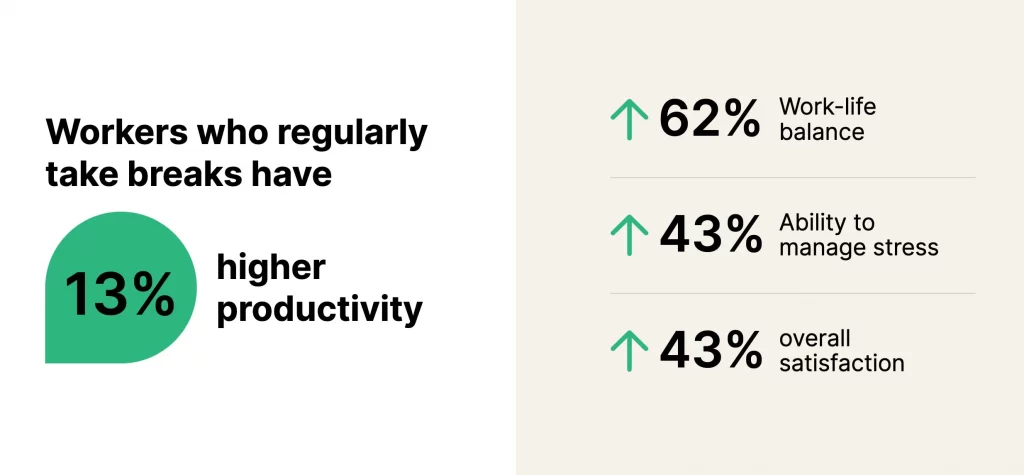
Do you take breaks?
If you don't, you should. Whether you embrace highly structured systems like the Pomodoro Technique, or simply give yourself some breathing room after a string of meetings or heavy thinking, breaks are important.
They give your brain a chance to recharge, provide an opportunity to get up and move around (especially important if you sit all day as a knowledge worker/white collar office worker), and allow your mind to shift focus between tasks and projects.
As usual, the best thing to do is to first get yourself straightened out if you have issues with this. Then, with your example being a positive one, you can become a multiplier by helping your team to remember to do the same.
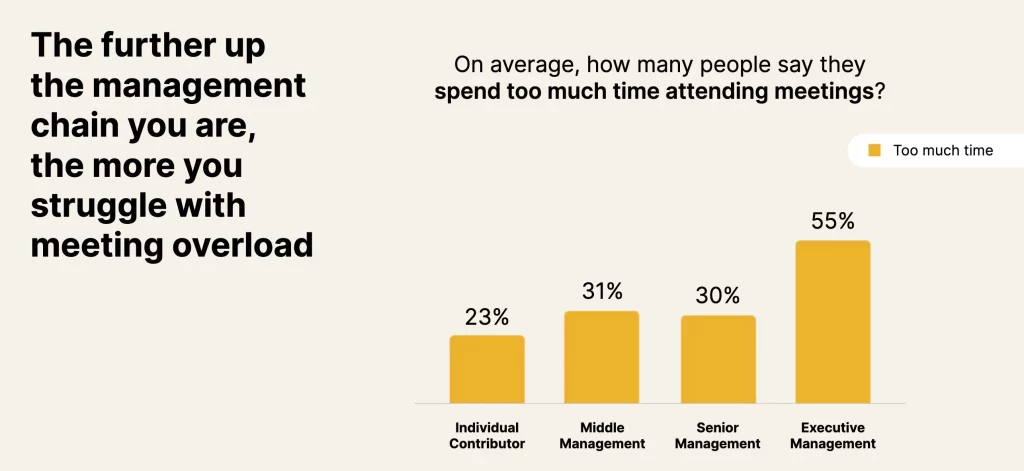
Across levels, there's a strong minority of people who feel like they're in too many meetings. Yet, it really gets out of control when you're an executive.
I still remember a friend telling me about his post-acquisition life (where he was a mid-level executive) described as:
"I drive in, park my car, walk in, get a coffee and then proceed to sit in meeting after meeting after meeting, non stop from 8am to 5pm. Then, I get back in my car, and drive home."
Not surprisingly, he was miserable, and ultimately left as soon as he could stomach how much of his earn out he would be leaving on the table.
How is your team's meeting hygiene? If you're worried your team feels like you have too many meetings, consider these 10 tactics to deal with the issue.
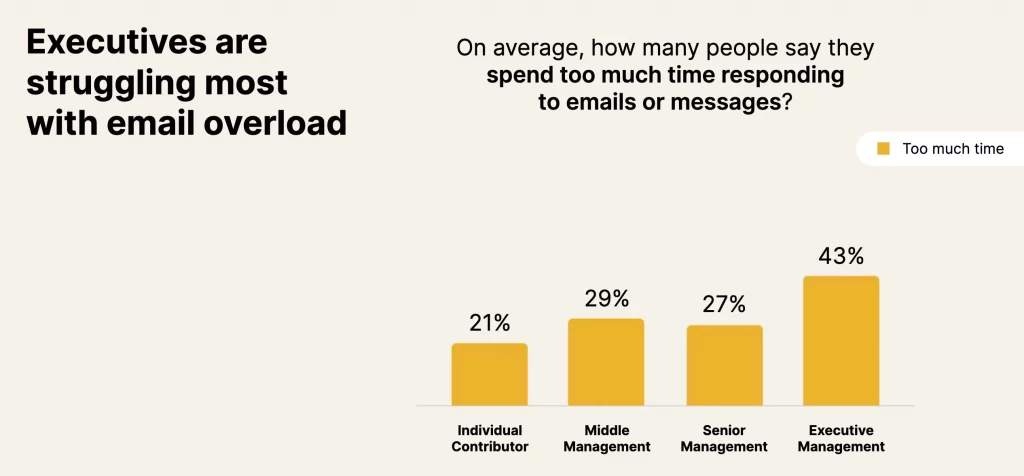
Communication isn't just sitting in meetings. It's also a lot of messages and emails.
As important as your culture is for managing and running meetings, how you communicate outside of meetings is just as important.
Sometimes, canceling a meeting just transfers the problem to email (or a document). That can be a net gain on time, but still be a drain on people's minds if they feel they have to keep up with it all still.
The best way to address that is to be just as thoughtful about your asynchronous communication as your synchronous communication (i.e.- meetings). Think about who really needs involved, the best ways to loop people in, and how best to engage them in ways that are the least taxing and most beneficial.
If you need to rethink your team's asynchronous communication, start with these posts:
- Learn how to balance and when to use synchronous vs. asynchronous communication
- Learn how to work remotely like a pro from a long time remote leader (which focuses on asynch communication skills)
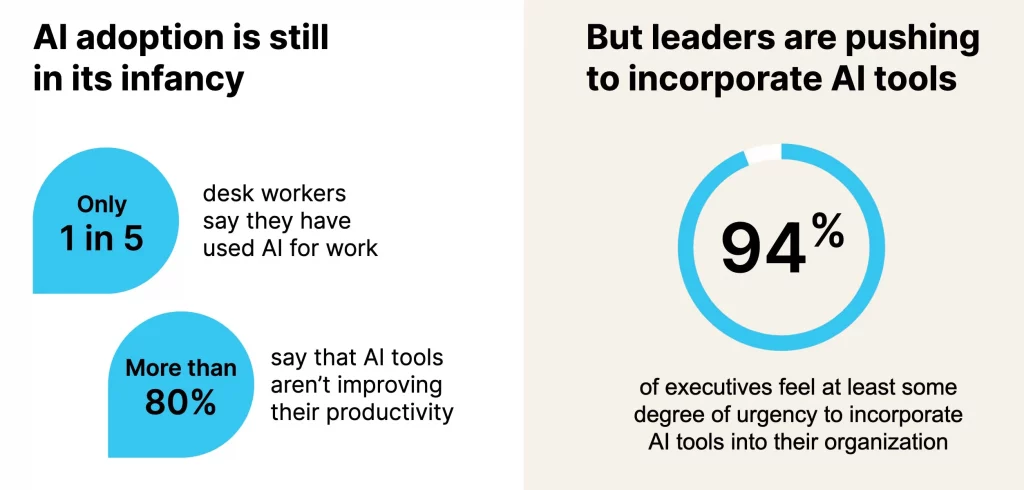
Shifting gears, it's interesting to see the reality of AI right now: more hype and awareness than actual use cases, it seems.
We are using AI in a variety of interesting ways at Lighthouse, but it seems with the data here, most companies aren't in that position. Seeing that 80% of workers aren't feeling more productive from AI, and aren't using AI for work shows we have a long way to go with adoption.
Now, this also makes the date of the survey *really* important. It was done in August and September, so basically 5 months ago. The AI field is moving fast, so it will be very interesting to monitor how this number changes going forward. I hope Slack keeps asking this question so we can monitor the trend.
That said, the takeaway from this is that if your team can find ways to use AI to be more productive, it will clearly be a competitive advantage, because most people aren't using it yet.
The potential gains of AI are significant, so it's well worth making a habit of trying to find ways to use AI, and encouraging your team to try things; you can be a multiplier once again by finding these gains and spreading them across your team and department.
How are you using AI? Reply and let me know and if we get enough responses, we'll share high level insights with everyone.
🗣️ Promote Your Message / Offer / Opening here...
Do you have a job opportunity, offer, or product you'd like to have reach the Lighthouse Leadership Weekly newsletter audience?
We're looking for aligned leaders and organizations to sponsor the newsletter by bringing readers products, services, and offers that align with our values and style.
This is your chance to reach tens of thousands of leaders while supporting Lighthouse.
Interested? Reply with more details on what you'd like to promote, etc.
Sign up to get this newsletter & our latest blog posts straight to your inbox:




